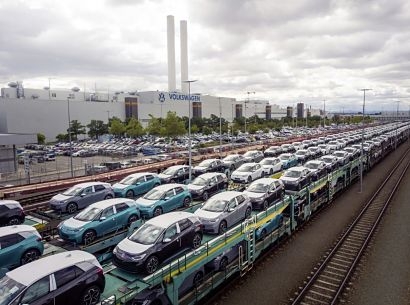
The switch to green electricity will reduce CO2 emissions by 26,700 tonnes a year compared to using the standard German electricity mix. 95 per cent of all such transportation is already powered by green electricity. In addition even more freight is set to go by rail: Volkswagen aims to increase vehicle transportation by train from 53 per cent today up to 60 per cent by 2022.
“With this green electricity offensive we are making an important contribution towards Group decarbonisation” said Thomas Zernechel, Head of Volkswagen Group Logistics. “For this purpose, Deutsche Bahn feeds in electricity from wind farms and hydropower plants. No car maker in Europe transports more freight by rail using renewable electric power than Volkswagen. In addition to our electric vehicle production having a carbon-neutral footprint, this is a further element in being able, for instance, to hand vehicles from the Volkswagen ID range to customers without any CO2 baggage.”
Dr Sigrid Evelyn Nikutta, DB Freight Transport Director and Chair of DB Cargo, added that each ton being transported by rail automatically reduces CO2 emissions by 80 percent and that by making this switch, Volkswagen is sending out a strong signal and giving its backing to 100 percent green transportation with no CO2 emissions.
“That pleases us as DB Cargo and will please our environment even more” said Dr Nikutta.
When operations are running normally, over 190,000 freight wagons a year are in use for Volkswagen. On average 38 long-distance and 157 local trains a day deliver materials to the plants - in total around 100,000 wagons a year. Meanwhile, around 90,000 wagons take approximately 900,000 vehicles from the plants to 40 interim storage facilities, distribution centres and ports. The brands transported in this way are Volkswagen Passenger Cars, Audi, Skoda, Seat, Porsche and Volkswagen Commercial Vehicles.
For additional information:

